- Home
- Harlan Ellison
No Doors No Windows Page 18
No Doors No Windows Read online
Page 18
Eleanor Lombarda lay twisted in the dim yellow egg-shape of light cast by the desk lamp. Her auburn hair had fanned out against the unpolished floorboards, and she seemed, in death, all the more unattractive.
“An unpleasant person,” Ormond murmured to himself, lowering his perfectly round chin into his cupped hand. “Just perfectly unpleasant.
“You work with a person, you sweat with her, you give her good money and she turns against you.
“It just doesn’t seem fair, that’s all. Just doesn’t seem fair.” Then he added as a tentative afterthought, “She was a fine secretary, though. Just fine. But an unpleasant person.”
Then his thoughts sank darkly. This was nothing circumspect like providing short shrift on building materials. This was not cutting the quality of goods so the kickback would be fatter. This was—and he hesitated to use the word in so close a juxtaposition to himself—murder.
Oh, my God, I’ve killed her! he thought, an agonized grimace briefly masking his loose features. I’ve killed the girl. I never, oh I never would have wanted to do that. No one would believe me—if 1 told them I’d lost my head. They all say that, I imagine. Oh, good Lord, this is terrible! She’s lying there in the middle of my floor, and I’m just sitting here, looking at her. I’ll “have to do something,” he finished, aloud.
But what could he do? Ormond swung idly back and around in the swivel chair, as though seeking some direction that led out. When the big wall clock, donated by Prester’s Jewelry Store at the office’s opening, struck three o’clock, Hervey Ormond was no farther than before.
It had been different, a different thing when the State Investigating Committee had come. They had gone over his books, found them satisfactory and been quite pleasant about everything.
The roads had buckled and warped, fallen apart at the shoulders and split at the points of most wear, but as Ormond had told Senator Frankenson and the other distinguished visitors, “There’s been some pretty heavy and unusual weather in this state recently, gentlemen. You might not be aware of that in Washington, and it’s certainly no slur against you or your attentiveness to the local situation—your place is at the seat of our great government, naturally—but it’s something we’re all too aware of, around here.
“With all that, and these new fuels they’re using that eat into the very molecular structure of roadbeds these days, well…”
He had left it hanging as his hands hung outstretched. A man who had done his job despite the vagaries of Man and Environment.
The committee had left.
There had been a substantial amount deposited to Senator Frankenson’s personal account—under the listing “campaign fund donations”—that next week.
Hervey Ormond always paid his bill promptly.
And this bill, too, had been paid. After six years it had been stamped, sealed and spindled—as Eleanor Lombarda lay silently on the floor of his office.
The clock had passed the 4:15 position, and suddenly, abruptly, as though the idea had been perching there on his knee, sucking ruminatively at his consciousness, Ormond knew how he would get rid of his ex-secretary.
It was the work of ten minutes to get the cement mixings from the shed behind the building, mix the gloppy mess and lay Eleanor in it.
He stood by, leaning against a tree, watching her harden into the mass. When it was sufficiently dry, he would take her out, dump her on the grass—he imagined it would be quite heavy so he stripped off his jacket, hanging it on a low branch—and let her finish hardening completely.
Then he would put her in the trunk of the car, cover her with a brick tarpaulin, and drive up to Round Schooner Lake.
He would tell everyone that Eleanor had been forced to visit sick relatives hi Omaha. She had no one close here in town, and it was obvious a girl of her exceeding unattractiveness could not have a lover, so the ruse could very easily succeed.
With a little patience and a great deal of reserve, he was certain this bill would stay paid—and, happily, no rebates would be forthcoming.
He smiled, and listened to the crickets welcoming their baritone accompanists.
The drive to Round Schooner was quiet and pleasant.
The state troopers were, also; and they looked alike, of course. They were faceless and looked alike. Had one been two-headed with purple warty skin and wearing tie and tails, and the other a six-armed and gelatinous mass of mold, they would have looked alike to Hervey Ormond.
They were whipcord, impartial, disinterested Furies. They had come for him, and they meant to take him away. His State prescribed the electric chair; and though he had a great and abiding fear of personal extinction, he had an even greater fear of closed-in places. His State had its appeal for reinstatement of the death penalty in the courts. At the moment, his State prescribed nothing but years in closed-in places.
“All right, Mr. Ormond, get your hat. Let’s go.”
They walked him down the steps of the building, while the entire office staff watched. They hustled him heavily into the patrol car, and tooled it out the winding drive, onto the highway.
They sped toward the state police station five miles away, and beside Ormond in the back seat, the faceless police officer had decided to be clever.
“She came to the surface this morning…spotted by some kids fishing, Ormond.”
The fat little man clung to the car strap, silently watching the lines of houses and fir nurseries flit by.
And I’ve always been so good about paying my bills on time.
“Your big mistake,” the trooper said, with a grin, “was using your own cement. You should know that much sand don’t hold together.”
THE MAN ON THE JUICE WAGON
He took the hairpin curve at sixty-five, and the big truck-and-cab reeled drunkenly toward the edge of the road, toward the dark lip that pouted above nothingness. He pumped the air brakes and the rig squealed like a whale with a harpoon in its blowhole. Two baby-fat tires left the road and pawed air for a moment, then fell back, and the dynamite truck was around the bend. On the left, the rock wall of a nameless North Carolina hill rose up to an invisible peak, lost in darkness. To the right, unfenced, unprotected, the road fell off in a sheer drop, three hundred and eighty feet to the valley below; to tarpaper shacks huddled in cold and poverty. And on that thin strip of tarmac, room for two cars to pass ever so carefully (and one truck to pray no one was coming up, while it was coming down), Harry Fischer hunched over the big steering wheel, eyes squinting into the night, half-smoked butt wedged in a corner of his mouth, sweat chilling his neck and back…
Behind him in the truck section, the cases of nitro were murmuring in their gelatin straitjackets, and a harsh word would convince them they should forget their manners.
Beside him in the cab, the half-naked girl huddled against the other door, her gold-flecked eyes wide with terror, the whip scars still welling blood across her back, and her mouth open, dragging in air raggedly.
Back of him, and closing fast on the treacherous, twisting mountain road, was a caravan of four cars, holding a small army of pistoleros stinking of hate who didn’t give a damn how he went down the hole: in flames, over the edge of the road, like a shooting star…or from a shotgun blast that would turn him into one hundred and eighty pounds of dogmeat. It was all the same to them.
“Look out!” the girl shrieked, and Harry realized his eyes had been locked in road hypnosis, that the tarmac was twirling off to the left again. He walked the wheel between his hands, fast, and the truck careened around the bend, punched holes in the darkness with the beams of its two big heads, and roared away down a short slope. He flicked his eyes up without moving his head, and caught sight of the four pairs of lights behind him, in the rear-view; two single sets, and two sets of doubles, brights; bounding around the bend and down the slope in charge pursuit; they were gaining on him.
“Oh, yeahhh…” He drew the words out in whispered undertones, ruefully. “Are you ready for them!” He stomped the accel
erator and the big rig cleared its throat, dug in at the tarmac and pulled away. He felt pain at his lips, and ripped the roach of the cigarette out of his mouth. He dropped it and ground it against the rubber floormat.
“We’ll die! We’re never going to make it!” The girl was babbling. Harry didn’t even look over. If he’d been where she was, with some crazy asshole driving the way he was, he’d have been puking already.
There had to be a pull-off along the way…there had to be, or he wasn’t going to be hauling much freight in the future. His mouth was dry, now that the cigarette was gone, but there wasn’t a thing he could do about it; he couldn’t spare the effort or thought to light a fresh one; nor was there anything he could do about the four carloads of clowns behind him. The rear-view mirror sparkled and he tossed a glance into it. They were still back there, and coming in faster, it seemed. Harry’s foot refused to go any farther to the floor; more speed would be like taking an enema with a thermite bomb. Like spreading himself out across half, a mile of scenic North Carolina like peanut butter; like an uncomplicated suicide. And Harry was convinced he still had a couple of good hours left in him.
“Reach into my shirt pocket,” he said to the girl. “Light me a cigarette.”
His tone frightened her, on an entirely different level than the gut-wrenching fear of the men behind them, the road over which they hurtled, the death all around them. He was an ominous, cruel figure, beside her in the cab, his craggy features limned by the dash lights. She reached across his barrel chest and fingered the crumpled pack of cigarettes out of the pocket. “Matches on the seat somewhere,” he said, in a matter-of-fact way, screaming around a curve, missing the rock wall by inches.
She found them, lit the cigarette, coughed twice at their acrid brittle taste, and put it between his lips. “The pack,” he said. “Put it back where you got it, please.” She was amazed at his surface calm, but reached across once more, put the crumpled pack into his shirt pocket.
He drew deeply, threw smoke against the windshield, and made his decision. “When I stop, I want you out that door and down the road as fast as you can go. Do you understand?”
She looked at him with renewed fear. “I don’t have any shoes.”
His tone became softer, coping with the crazily appropriate remark as if it made sense, rather than as an indication of her nervousness. “That’s all right, the road is smooth, and it won’t be too far. Just try to get around a bend or under cover if you can. There might be an explosion.” Her eyes grew wide.
“But—”
“Do you understand?” he asked again, tightly. His patience was running thin. “Yes or no?” She nodded yes, but he was watching the road: he asked her again, and she answered with the one syllable, softly, timorously.
“Okay then,” he said, “open your door now. Don’t let it fly open, just slip the latch. Hold it ready to jump when I tell you.” He caught sight of the four cars pulling in like hunting falcons, above him in the rear view, behind him in the all-too-real world.
He took an S-curve right, then left, then right again, and for several beats was out of sight of the pursuers. The wheel seemed to flow like licorice in his hands as he slewed the rig sidewise, and amid the banshee-shriek of air brakes and peeling rubber, he jackknifed the cab left, right, left again, and wedged it between the rock-wall and the end-on bulk of the truck that lay across the road, its right rear wheels on the lip of the precipice. He had effectively blocked the road by turning the rig into an L-shaped barricade. “Now jump!” he howled at her, shoving her against the open door as hard as he could.
The girl tumbled out of the cab, hit the ground, rolled like a jellybean, and came up with slim legs pistoning, flashing white as her torn dress flapped about her thighs. She was running running and down the road…the sound of heavy boots running behind her, and she tossed a quick glance around; it was Harry Fischer, broken-field sprinting as though time was running out. They gained the safety of a bend, and Harry caught up with her.
“Here, take my hand!” He started climbing the raggedy face of the rock-wall. They were more than fifty feet up, moving like mountain goats, quickly, effortlessly on the ledged rock-wall, when they saw the lights of the first car slithering around the bend. They could not see what happened, but there was a squeal of brakes, a sound of something tearing, and then the car smashed full into the rig. There was an electric moment of waiting, and then the second car hit, the third, the fourth, and then came the explosion. It caught the night and tore it up the middle viciously. The sound was incredible, like a thousand rifles going off inside the semicircular canal of the ear. A whanging, metallic report that ratcheted back and forth through the mountains, building, building, phasing itself up like a dynamo gaining momentum. Harry threw himself across the girl as they hung there on the rock wall and the girl clapped her hands against her ears, a scream tearing from her mouth. The explosion seemed to go on forever, and then bits of metal and rock and dirt and foliage and—other things, cascaded down on them.
Harry started to move, flattening himself protectively against the girl, when something huge and black and heavy came down out of the night sky and clipped him solidly across the top of his skull. He sagged without a sound, and started to slip away. The girl grabbed for him, they lost their footing and tumbled in a welter of rock and dirt down the rock wall. He hit first and lay crumpled, and an instant later she crashed down on top of him. She tried to rise, the debris continued to pelt them, and she was caught by a bit of tree stump that took her high above the right eye; and with a tiny murmur of pain she sagged across Harry Fischer’s body.
They lay there, unmoving, while the faraway hills echoed the dying gasps of the explosion, farther and farther away, till only the stars shied back and hid from the sound.
When he swam up through the ebony pain, Harry knew he was where he was, but superimposed over the watery image of the returning scene around him was another scene, not too far back in the past. He had been coming through the mountains, had stopped in the little town for a cup of joe, a couple of sinkers and a goofball to keep him awake the rest of the run to the excavations. There had been a carnival in the town. One of those balk-line jobs with a freak tent and half a dozen rube games rigged to pay once in ten thousand tries, a couple of animals, maybe a geek, a cotton candy bowl, and a nautch tent with half a dozen worn-over hags.
Harry had wandered down the midway and bought a suety hot dog, and a twist-cup of pink lemonade that tasted as though a boar had urinated in it. As he had come to the darker end of the midway he had heard the scream, and the girl pleading not to be hit again. Then the crack of a whip—that sound unlike any other sound in the world, when thong leather strikes flesh and draws blood—and another scream.
He had dropped the wienie and the pee-juice, and plunged into the darkness at the end of the midway. Behind the road trucks used to haul canvas and booths, there had been a dozen men in white sheet hoods, and one of them was beating the crap out of a blonde, her dress ripped in half a dozen places, and the whip lash-marks already thick and dark across her back and breasts. The man with the whip yelled “Whore!” and pulled his arm back to let her have it again.
Harry had barely realized what he was doing. A sharp remembered image of his mother being struck across the face by his father when he had been a child—it came and went—and he was on his way already. He hadn’t even thought of the ridiculous odds. A dozen big men who could tear his arms from their sockets and shillelagh him to death with the bloody ends.
He had caught the leader low in the back, like a pile-driver, and the man shot forward into the crowd like a cannonball. The whip had flown from his hand, and Harry quickly retrieved it. “Back, you buncha bastards!” he screamed shrilly, and cracked the whip around his head like a cowboy. They had fallen back, the circle of pain he created with the whip keeping them at bay. He grabbed the girl under one arm and started dragging her away.
They were moving in and he nicked the whip toward their faces with
vicious determination. They had fallen back, and in one quick movement he picked the slight girl up in his arms and ran like a madman. He gained the cab of the truck just as they burst out from between the carny tents, and in a second he was inside, the doors locked, and the motor kicking.
The mob had grown by two or three men, unmasked, and one of them had a shotgun. He leveled it, ready to blow a hole through the cab, but one of the others had pointed in panic to the legend on the door of Harry’s cab: THE MAN ON THE JUICE WAGON DANGER DYNAMITE EXPLOSIVES DANGER and the shotgun had gone down off point fast. Then Harry had kicked the heap, and gunned it forward. The big hulk had jumped as though goosed, and the hooded men had leaped out of the way.
A turn out into the town, a short run to the highway, and then out, climbing. And then the headlights behind him. The death-chase, the jackknifed rig, climbing the rock wall with the girl, the explosion and he had Had It….
The scene flashed in an instant, re-told everything, and he came back to consciousness lying at the side of the road with the girl on top of him. His head ached as though someone had steam-driven a tenpenny spike in behind each eye, with a third shard of steel into his medulla oblongata, just for a fail-safe. He groaned, and the girl squirmed on his body. It was a disconcerting combination of feelings. The pain, and the pleasure.
Harry slid out from under her.
He staggered around the roadway for a few moments, trying to convince his synaptic relays they weren’t sending out orders for spaghetti. When he had mastered the trick of walking without falling down, he went back to the girl, and lifted her by the waist. She sat up, groaned in a fine alto, and opened her eyes blearily.
“Let’s get out of here,” he said. “Some of them may have made it through little Hiroshima down the road.”

 Repent, Harlequin! Said the Ticktockman
Repent, Harlequin! Said the Ticktockman Broken Glass
Broken Glass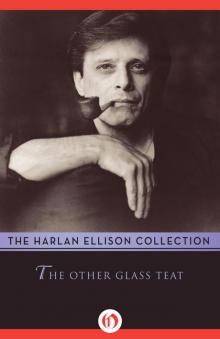 Other Glass Teat
Other Glass Teat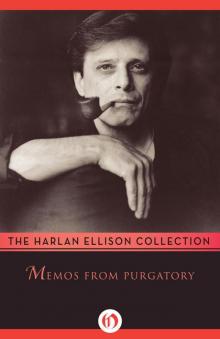 Memos From Purgatory
Memos From Purgatory I Have No Mouth and I Must Scream
I Have No Mouth and I Must Scream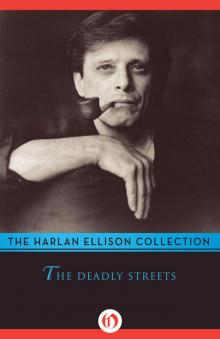 The Deadly Streets
The Deadly Streets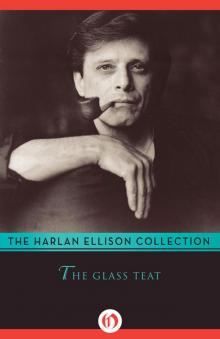 The Glass Teat
The Glass Teat Paingod and Other Delusions
Paingod and Other Delusions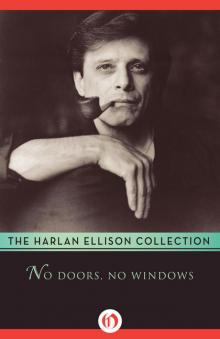 No Doors No Windows
No Doors No Windows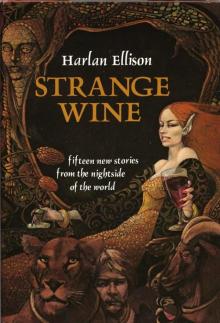 Strange Wine
Strange Wine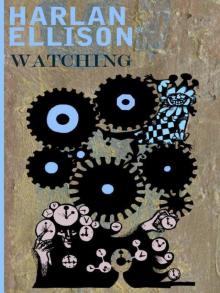 Harlan Ellison's Watching
Harlan Ellison's Watching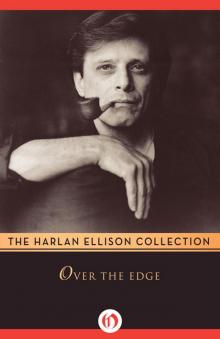 Over the Edge/An Edge in My Voice
Over the Edge/An Edge in My Voice Troublemakers: Stories by Harlan Ellison
Troublemakers: Stories by Harlan Ellison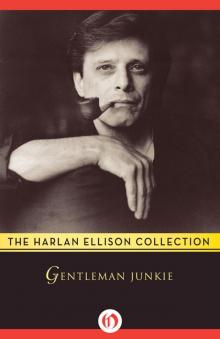 Gentleman Junkie and Other Stories of the Hung-Up Generation
Gentleman Junkie and Other Stories of the Hung-Up Generation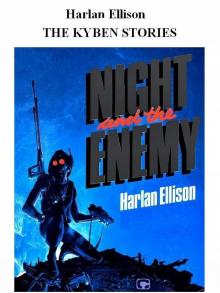 The Kyben Stories
The Kyben Stories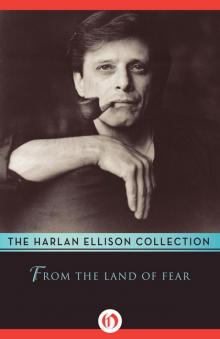 From the Land of Fear
From the Land of Fear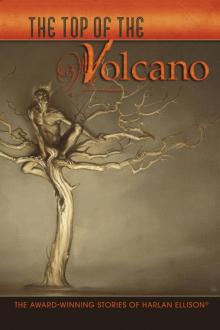 The Top of the Volcano: The Award-Winning Stories of Harlan Ellison
The Top of the Volcano: The Award-Winning Stories of Harlan Ellison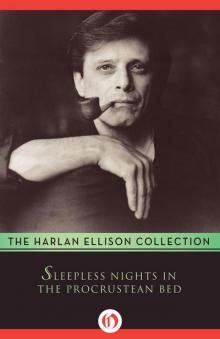 Sleepless Nights in the Procrustean Bed
Sleepless Nights in the Procrustean Bed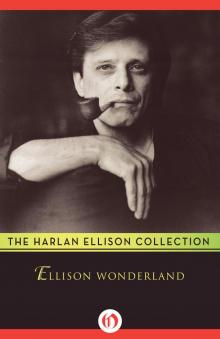 Ellison Wonderland
Ellison Wonderland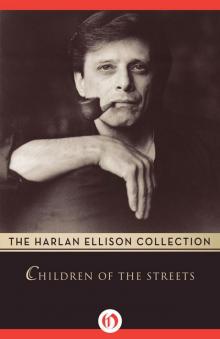 Children of the Streets
Children of the Streets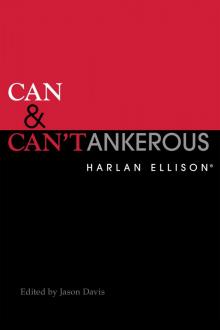 Can & Can'tankerous
Can & Can'tankerous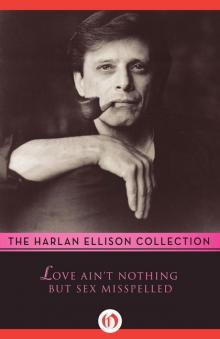 Love Ain't Nothing but Sex Misspelled
Love Ain't Nothing but Sex Misspelled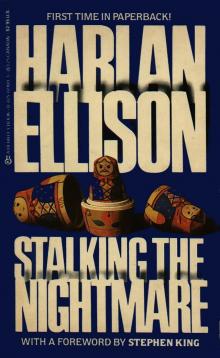 Stalking the Nightmare
Stalking the Nightmare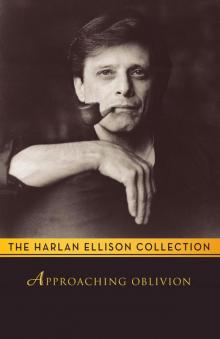 Approaching Oblivion
Approaching Oblivion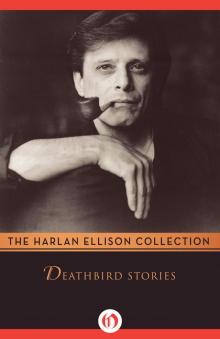 Deathbird Stories
Deathbird Stories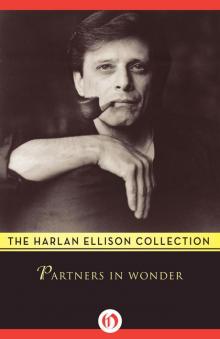 Partners in Wonder
Partners in Wonder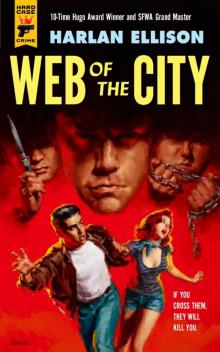 Web of the City
Web of the City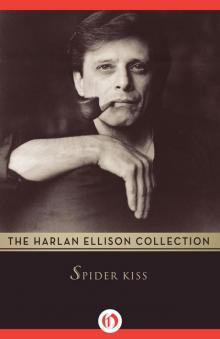 Spider Kiss
Spider Kiss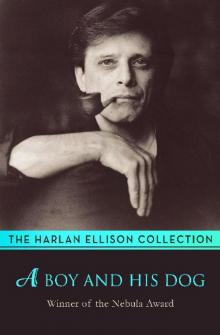 A Boy and His Dog
A Boy and His Dog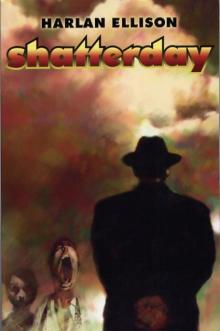 Shatterday
Shatterday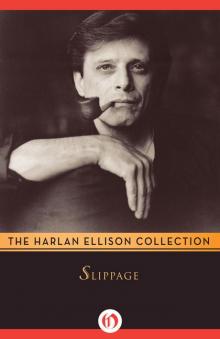 Slippage: Previously Uncollected, Precariously Poised Stories
Slippage: Previously Uncollected, Precariously Poised Stories Repent, Harlequin! Said the Ticktockman
Repent, Harlequin! Said the Ticktockman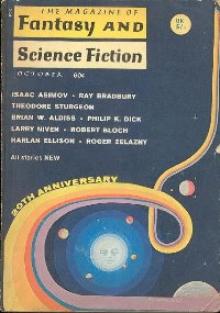 Come to Me Not in Winter's White
Come to Me Not in Winter's White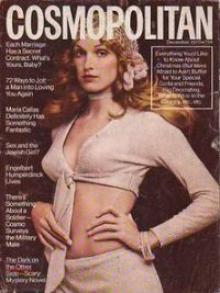 The Song the Zombie Sang
The Song the Zombie Sang The Other Glass Teat
The Other Glass Teat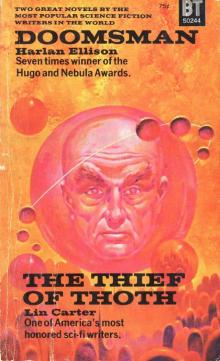 Doomsman - the Theif of Thoth
Doomsman - the Theif of Thoth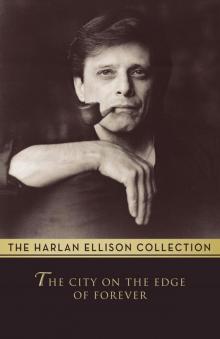 The City on the Edge of Forever
The City on the Edge of Forever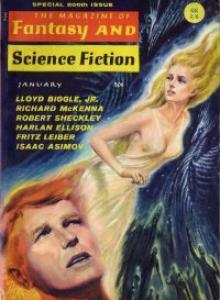 I See a Man Sitting on a Chair, and the Chair Is Biting His Leg
I See a Man Sitting on a Chair, and the Chair Is Biting His Leg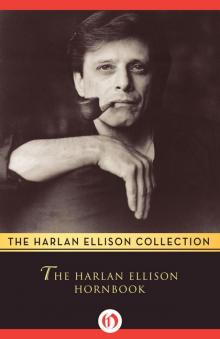 The Harlan Ellison Hornbook
The Harlan Ellison Hornbook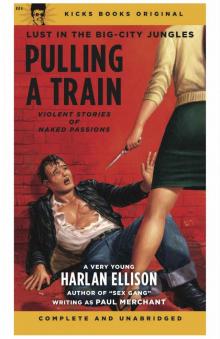 Pulling A Train
Pulling A Train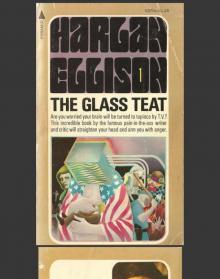 The Glass Teat - essays of opinion on the subject of television
The Glass Teat - essays of opinion on the subject of television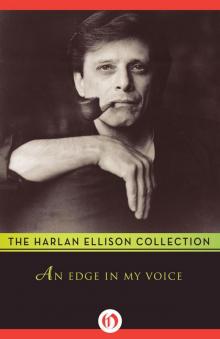 An Edge in My Voice
An Edge in My Voice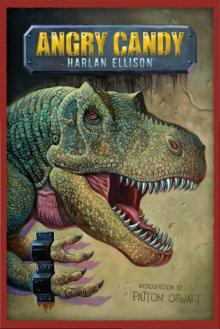 Angry Candy
Angry Candy Troublemakers
Troublemakers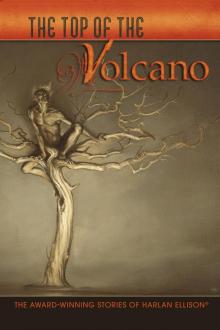 The Top of the Volcano
The Top of the Volcano Over the Edge
Over the Edge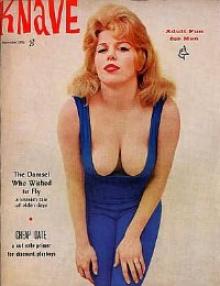 Survivor #1
Survivor #1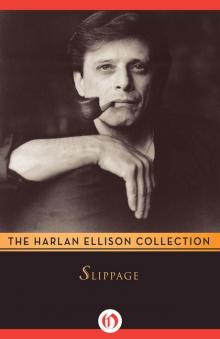 Slippage
Slippage